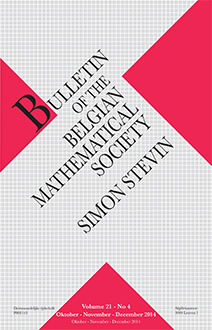Abstract
It is proved that if $k$ and $d$ are positive integers such that the product of any two distinct elements of the set \[ \{F_{2k},\, 5F_{2k},\, 4F_{2k+2},\, d\} \] increased by $4$ is a perfect square, than $d=4L_{2k}F_{4k+2}$. This is a generalization of the results of Kedlaya, Mohanty and Ramasamy for $k=1$.
Citation
Andrej Dujella. A. M. S. Ramasamy. "Fibonacci numbers and sets with the property $D(4)$." Bull. Belg. Math. Soc. Simon Stevin 12 (3) 401 - 412, September 2005. https://doi.org/10.36045/bbms/1126195344
Information





